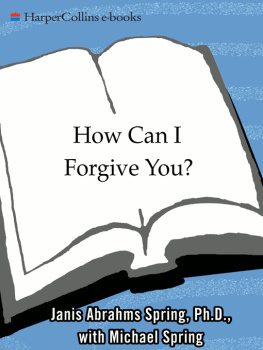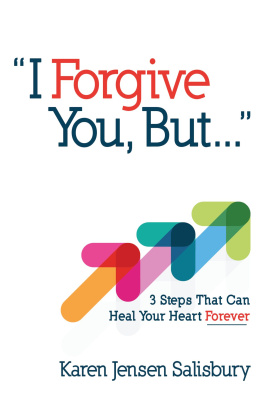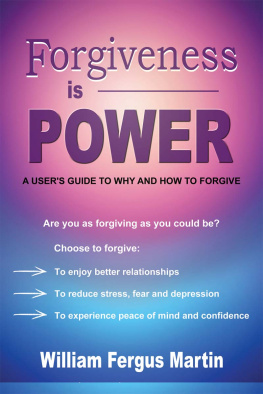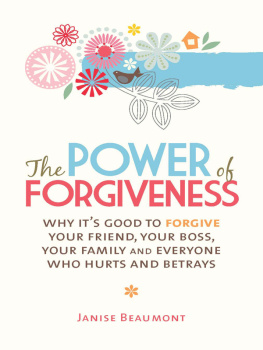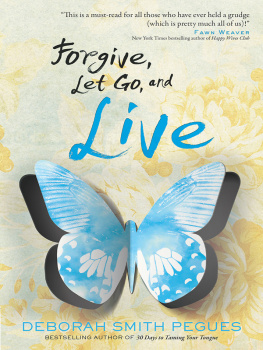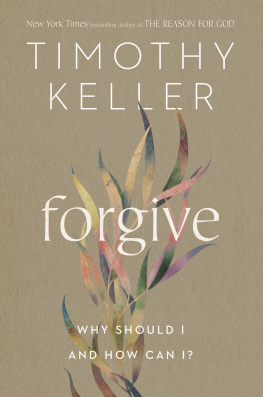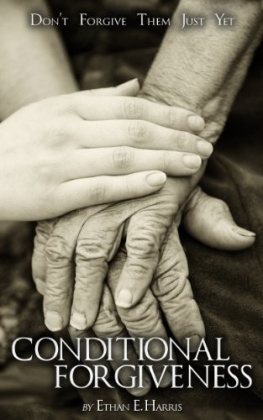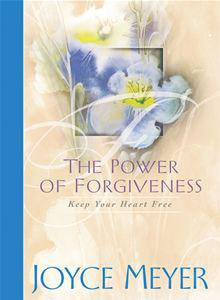Spring - How Can I Forgive You?
Here you can read online Spring - How Can I Forgive You? full text of the book (entire story) in english for free. Download pdf and epub, get meaning, cover and reviews about this ebook. year: 2014, publisher: HarperCollins e-Books, genre: Home and family. Description of the work, (preface) as well as reviews are available. Best literature library LitArk.com created for fans of good reading and offers a wide selection of genres:
Romance novel
Science fiction
Adventure
Detective
Science
History
Home and family
Prose
Art
Politics
Computer
Non-fiction
Religion
Business
Children
Humor
Choose a favorite category and find really read worthwhile books. Enjoy immersion in the world of imagination, feel the emotions of the characters or learn something new for yourself, make an fascinating discovery.
- Book:How Can I Forgive You?
- Author:
- Publisher:HarperCollins e-Books
- Genre:
- Year:2014
- Rating:4 / 5
- Favourites:Add to favourites
- Your mark:
- 80
- 1
- 2
- 3
- 4
- 5
How Can I Forgive You?: summary, description and annotation
We offer to read an annotation, description, summary or preface (depends on what the author of the book "How Can I Forgive You?" wrote himself). If you haven't found the necessary information about the book — write in the comments, we will try to find it.
Spring: author's other books
Who wrote How Can I Forgive You?? Find out the surname, the name of the author of the book and a list of all author's works by series.
How Can I Forgive You? — read online for free the complete book (whole text) full work
Below is the text of the book, divided by pages. System saving the place of the last page read, allows you to conveniently read the book "How Can I Forgive You?" online for free, without having to search again every time where you left off. Put a bookmark, and you can go to the page where you finished reading at any time.
Font size:
Interval:
Bookmark:
The Courage to Forgive,
the Freedom Not To
Janis Abrahms Spring, Ph.d.,
With Michael Spring

With love, to our growing family
Aaron, Max, Evan, Declan, Robin, baby Caleb, and Pop
Part One
CHEAP FORGIVENESS
Part Two
REFUSING TO FORGIVE
Part Three
ACCEPTANCE
Part Four
GENUINE FORGIVENESS
A ny book on forgiveness should begin at home. I ask our children and familyMax, Aaron, Evan, Declan, Robin, Caleb, and Dadto please forgive Michael and me for being so grossly preoccupied and unavailable these last two years as we threw ourselves into this book project. We intend to work hard to earn your forgiveness by showing you how much we love you in the years ahead.
Is there any activity more intimate than writing a book with your life partner? Michael, I forgive you, once again, for taking what I often believed to be an excellent (no, perfect) passage from my manuscript, and asking me to ask myself your four signature questions: Is this interesting? Is it important? Does it follow? Is there a way of saying it with one wordone syllablerather than two? I forgive you for (almost) always being right, as annoying as that is. It has been a wonderful collaboration, filled with intimate battles over transitions and ways to bring abstract psychological concepts down to earth.
To Gail Winston, my remarkable editor at HarperCollins, thank you for your sensitive editing and good nature. To Jo-Lynne Worley, my agent, thank you for your enthusiastic support and thoughtful feedback. Im touched that both of you voluntarily subjected yourself to one of my six-hour courses on trust and forgiveness, and appreciate your genuine interest in me and my work. My thanks as well to Christine Walsh for your patient, reliable assistance at HarperCollins.
Rabbi Israel Stein of Congregation Rodeph Sholom in Bridgeport, Connecticut, thank you for repeatedly meeting with Michael and me and offering us your profound wisdom and sweet encouragement. I hunted hard for a rabbi who would shake me out of my indifference, help me bind my wounds, and inspire me to live more consciously. I found that person in you. Youre a gifted, original thinker and a warm, dear friend. Forgive me for quoting you so often throughout this book.
Reverend Gary Wilburn of The First Presbyterian Church of New Canaan, Connecticut, thank you for making yourself available to me, even though I was a total stranger to you. You generously welcomed me into your office and shared your provocative and humane thoughts about forgiveness. Your congregation is fortunate to have a spiritual leader who cares so deeply about their suffering, and looks for profound spiritual answers to interpersonal grievances.
Sometimes inspiration comes from unlikely sources. Michael and I would agree that the two houses we rented to complete this book provided a setting for our most productive, creative, happy moments. We want to thank Mary and Dan Maffia for letting us use their amazing house on the Cape; and Emily and Albert Foss-brenner of Yardley, Pennsylvania, for their writers cottage, which we occupied over Thanksgiving, and then, for going way beyond the cause, and insisting that we feast with them in their home for the holiday.
There have been many mentors who have shaped me personally and professionally. Harriet Lerner, whom I once admired from a distance for her warm, funny, wise voice, has become a close friend who has pushed me to trust my own voice. Aaron Beck trained me in cognitive-behavior therapy and gave me a framework for helping people shed their emotional pain. And Jeffrey Young permitted me to adapt his schema therapy model to the process of forgiveness. I thank all of you for the central role youve played in my writing this book.
Of course, there would be no book without my patients. Im indebted to you for allowing me to witness and participate in your bold search for an emotionally authentic response to your intimate wounds. You brought to life for me the wisdom of psychotherapist Jeanne Safer, who wrote, Sometimes what people really need is permission not to forgive, to feel what they feel. Your struggle to find a resolution thats healthy and humanone that doesnt require you to forgive an unrepentant offenderinspired me to suggest a radical alternativeAcceptance. You taught me that your decision not to forgive need not foreclose resolution; it may be the step that makes it possible.
You also taught me that sometimes what the hurt party really needs is permission to forgiveto reframe forgiveness as an act of courage, not desperation or self-denial.
Finally, I want to thank the forgiveness experts who have laid the groundwork. It has been said that those who tend to be more open-minded tend to be more forgiving. I hope that those whose ideas Ive challenged will be open-minded and forgive me, and continue a dialogue with mea search for a working model of forgiveness that serves real people seeking to survive and transcend the misery of real-life transgressions.
T heres a wonderful story about two kids playing in a sandbox together. One gets mad and storms off with his toy truck. As he runs to the swings nearby, he turns and cries out to his playmate, I hate your guts and Im never going to talk to you again. About ten minutes pass, and theyre throwing a ball at each other, laughing, enjoying the day. As their parents observe this interaction, one father shakes his head and says to the other with a mix of admiration and amazement, How do kids do that? How can they be at each others throat one minute and get along with each other so famously the next?
Its easy, the other father explains. They choose happiness over righteousness.
I love this story. Its so filled with the bounty of the human spirit, with affirmation of our ability to adapt, to resolve our petty disputes and focus on what really matters most to us in life. We are social beings who need each other, who inherently prefer to repair interpersonal ruptures than to hate or hold a grudge. Most of us want, and like, to forgive.
The problem with the sandbox story is that its about children who reconcile after an insignificant grievance. Its not about what happens between two adults when one willfully and maliciously hurts the other, and the hurt party is left to grapple with how to forgive or reconcile with the offender. Thats a much more complex story.
Some of us believe we have an obligation to forgive, unconditionally, categorically, and that to do so is central to what it means to be a decent human being. Most of us, however, cant live up to such high moral principles except in theory, or feel that we would compromise ourselves if we did. We cantand wontjust dust off an injury, pretend that nothing happened, and embrace the person who injured us. Regardless of what we may have been taught, a quick, one-sided, kiss-and-make-up response doesnt seem real or right. For Genuine Forgiveness to take place, we often need much more.
WHAT DOES IT MEAN TO FORGIVE?
Most of us have been raised on several dubious assumptions that need to be debunked. Lets look at them.
Questionable Assumption #1: Forgiving is good for you. When you forgive, you get rid of the poison inside you and restore your health. When you refuse to forgive, you get sick and suffer.
Forgiving has been marketed as the new mental and physical panaceaa healing balm that cures every ailment: depression, anxiety, chronic hostility, high blood pressure, heart disease, stroke, cancer, and immune deficiencies. It has also been said to repair broken hearts, broken relationships, a broken sense of self. Forgiving is the only remedy for the pain the offender left us with, the only way to heal the hurt he caused, writes Lewis Smedes in The Art of Forgiving .
Font size:
Interval:
Bookmark:
Similar books «How Can I Forgive You?»
Look at similar books to How Can I Forgive You?. We have selected literature similar in name and meaning in the hope of providing readers with more options to find new, interesting, not yet read works.
Discussion, reviews of the book How Can I Forgive You? and just readers' own opinions. Leave your comments, write what you think about the work, its meaning or the main characters. Specify what exactly you liked and what you didn't like, and why you think so.

